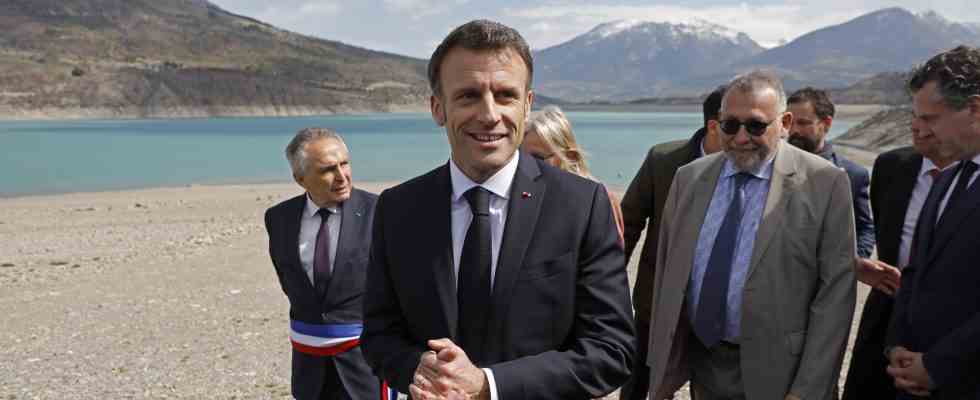Status: 03/30/2023 6:35 p.m
With dry summers and dry winters, water is becoming increasingly scarce in France. Head of state Macron is relying on massive savings with his water plan. Agriculture is particularly challenged.
The figures presented by French President Emmanuel Macron are as sober as they are clear. “As a result of climate change, we will have 30 to 40 percent less water available by 2050,” said the head of state when he presented his water plan for Western Europe’s largest freshwater reservoir – the Lac de Serre-Ponçon in southern France.
Caroline Dylla
ARD Studio Paris
The situation is already more than tense. According to the National Research Bureau of Geology and Mining, 80 percent of France’s groundwater resources were below normal in February. They were unable to recover from last year’s extremely dry summer because there had been too little rain in autumn and winter.
Sectors should draw up austerity plans
The first thing to do is to prepare for the coming summer, said the President. “Similar to what we did last year with energy saving, we will ask key sectors to develop water saving plans by the summer.”
To this end, the responsible ministers would meet with representatives from various sectors in the coming days. “Energy, industry, tourism, agriculture. It works well when everyone takes responsibility and the effort is shared,” said Macron.
Friederike Hofmann, ARD Paris, on Macron’s planned measures to combat water shortages in France
tagesschau24 2 p.m., 30.3.2023
State promises 100 million euros in aid
In addition, Macron issued a long-term goal: ten percent of water consumption should be saved by 2030. In addition to the energy sector and industry, agriculture plays an important role. Because almost 60 percent of the water consumption in France can be traced back to this branch of the economy.
But the challenge here is different, emphasized Macron. “Our sovereignty in food supply is non-negotiable. And we have a simple principle here: We will have to irrigate more in the future – but with the same amount of water that is available to us today.”
France needs innovations and better organization. In addition, farmers would have to be supported if they were to work in a water-saving manner. Therefore, the state will provide an additional 100 million euros per year to promote such technologies.
“A really fundamental change”
Gonérie Le Cozannet believes that a fundamental culture change is necessary, especially in agriculture. He is a geographer and co-wrote the last report of the Intergovernmental Panel on Climate Change.
A first possibility is to eat less meat. Production requires a lot of water, which puts stress on the soil, he says. In addition, a more environmentally friendly agriculture must be created. “For example by reducing nitrate and pesticide pollution. Because we also have to take care of the water quality.”
The geographer calls for the soil to become more permeable again; the water comes through and reaches the groundwater reservoirs. This could be achieved by less intervention in the natural landscape. “So it’s about a really fundamental change.”
Pricing system should motivate consumers
Another important aspect is making better use of wastewater. To date, only around one percent of the treated wastewater in France has been reused. By 2030, according to Macron, this proportion should increase to ten percent. A last – very tangible – point of the water plan is a price system that should motivate private consumers to save.
“We need a graduated price system that appeals to responsibility. The first cubic meters will continue to be cheap for everyone; i.e. the amount that we need for drinking and washing as well as for daily use in the household,” explained the head of state. Anyone who consumes more also has to pay more for it. “That seems normal to me for consumption that is only for convenience – and it’s supposed to be an incentive to save water.”
Committee to monitor implementation
Overall, the water plan includes around 50 smaller and larger measures that should reduce consumption or at least make use more efficient. From September, the “National Water Committee” – an advisory body based in the Ministry of the Environment – will report at least twice a year on the implementation of the measures.
When it just doesn’t rain enough: Macron presents the national water plan
Carolin Dylla, ARD Paris, 3/30/2023 5:15 p.m

